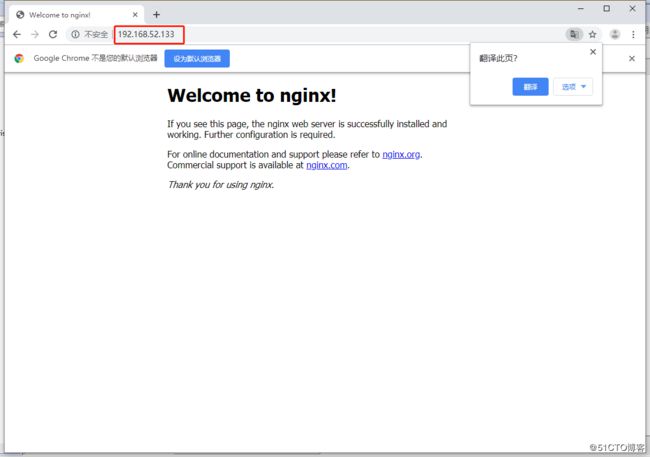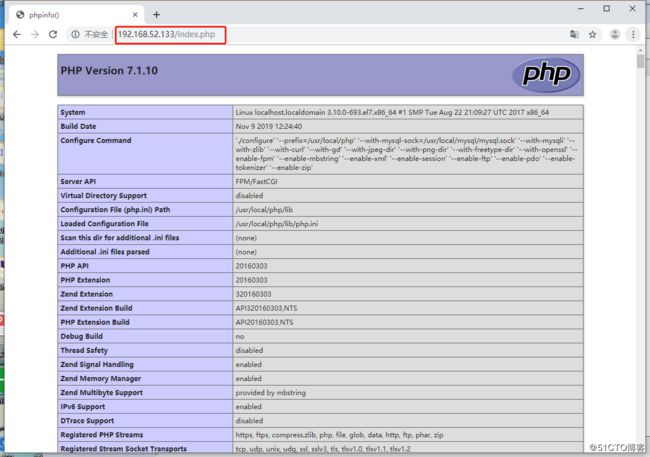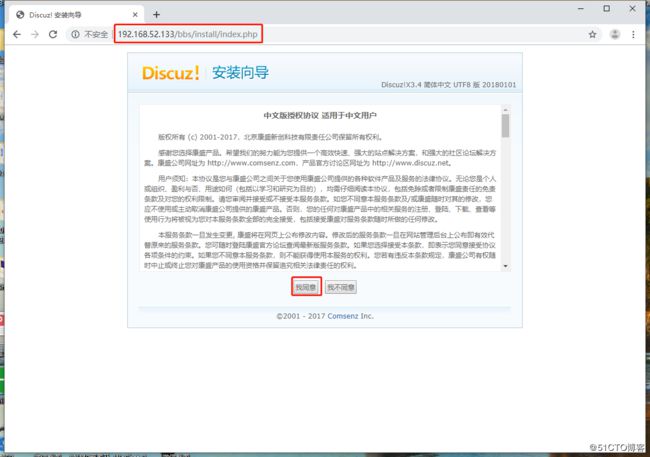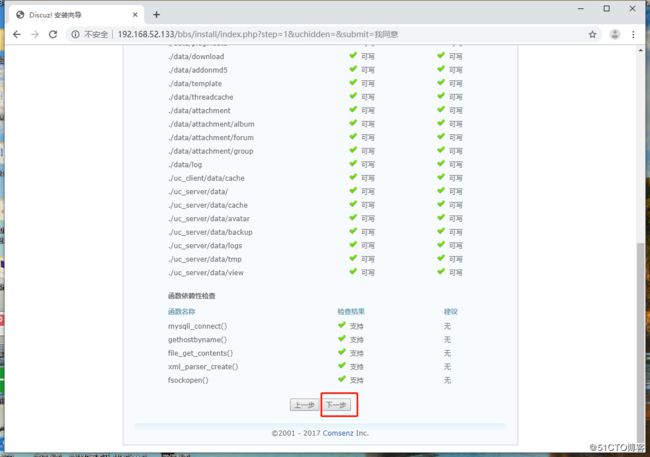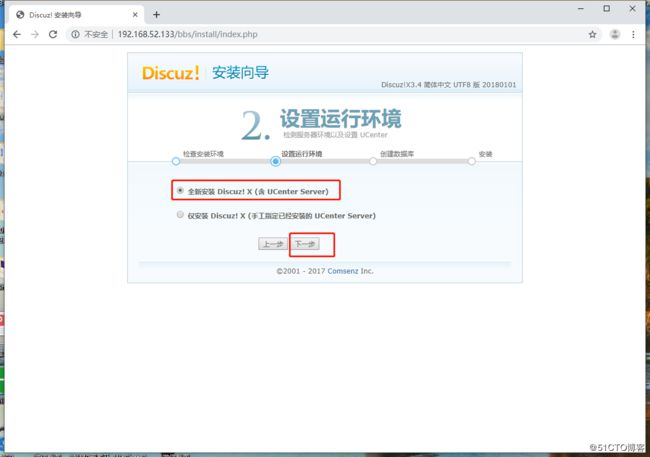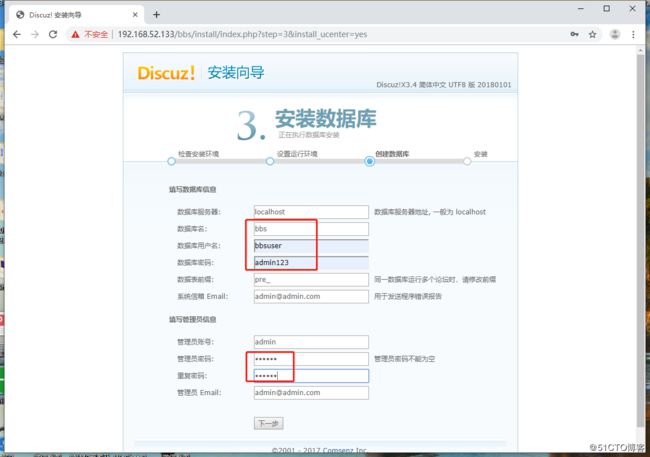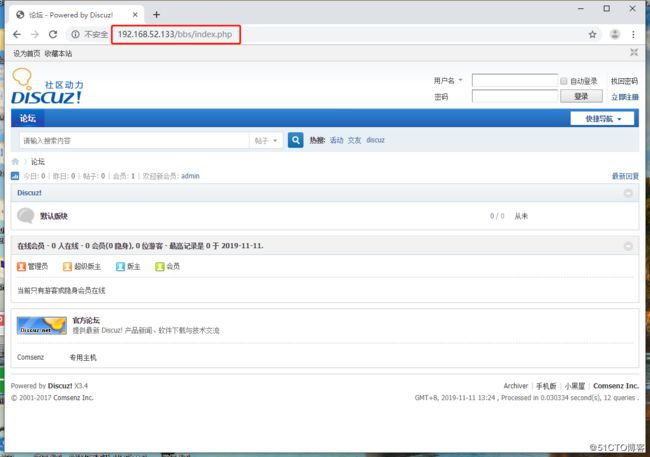什么是LNMP架构
LNMP平台就是Linux、Ngnix、 MySQL、 PHP的组合架构,需要Linux服务器、MySQL数据库、PHP解析环境
MySQL安装配置
为了与Nginx、PHP环境保持一致,此处选择采用源代码编译的方式安装MySQL组件
MySQL部署的方法
- 编译安装MySQL
- 优化调整
- 初始化数据库
- 启动mysq|服务并设置root数据库账号的密码
PHP解析环境的安装
配置网页动静分离,解析PHP,有两种方法可以选择
- 使用PHP的FPM模块
- 将访问PHP页面的Web请求转交给Apache服务器去处理
较新版本的PHP已经自带FPM模块,用来对PHP解析实例进行管理、优化解析效率
- FastCGI将Http Server和动态脚本语言分离开
- Nginx专门处理静态请求,转发动态请求
- PHP_FPM专门 ]解析PHP动态请求
单服务器的LNMP架构通常使用FPM的方式来解析PHP,本次也使用FPM模块处理动态请求。
PHP编译安装步骤
- 编译安装PHP
- 编译选项时添加"--enable-fpm” 以启用此模块
- 安装后的调整,主要是配置文件的建立与相应命令工具的路径优化
- 安装ZendGuardloader (提高PHP解析效率),并进行加载配置
实验准备
1.将宿主机上的工具包共享出去
2.通过Samba服务将工具包挂载到Linux系统
[root@localhost ~]# mkdir /mnt/tools
[root@localhost ~]# smbclient -L //192.168.100.50/
Enter SAMBA\root's password:
OS=[Windows 10 Enterprise LTSC 2019 17763] Server=[Windows 10 Enterprise LTSC 2019 6.3]
Sharename Type Comment
--------- ---- -------
IPC$ IPC 远程 IPC
share Disk
tools Disk
Users Disk
Connection to 192.168.100.50 failed (Error NT_STATUS_RESOURCE_NAME_NOT_FOUND)
NetBIOS over TCP disabled -- no workgroup available
[root@localhost ~]# mount.cifs //192.168.100.50/tools /mnt/tools/
Password for root@//192.168.100.50/tools:
[root@localhost ~]# 编译安装Nginx服务
1.将nginx服务源码包解压到“/opt/”目录
[root@localhost ~]# cd /mnt/tools/
[root@localhost tools]# ls
awstats-7.6.tar.gz extundelete-0.2.4.tar.bz2 forbid.png jdk-8u191-windows-x64.zip LAMP-C7 picture.jpg
cronolog-1.6.2-14.el7.x86_64.rpm fiddler.exe intellijideahahau2018.rar john-1.8.0.tar.gz LNMP
[root@localhost tools]# cd LNMP/
[root@localhost LNMP]# ls
Discuz_X3.4_SC_UTF8.zip mysql-boost-5.7.20.tar.gz nginx-1.12.2.tar.gz php-7.1.10.tar.bz2 php-7.1.20.tar.gz
[root@localhost LNMP]# tar zxvf nginx-1.12.2.tar.gz -C /opt/
...............//省略解压过程
[root@localhost LNMP]#2.安装编译所需工具包
[root@localhost ~]# yum install gcc gcc-c++ pcre-devel zlib-devel -y
...........//省略安装过程
[root@localhost ~]#3.切换到nginx服务源码包目录,创建一个nginx用户
[root@localhost LNMP]# cd /opt/
[root@localhost opt]# ls
nginx-1.12.2 rh
[root@localhost opt]# cd nginx-1.12.2/
[root@localhost nginx-1.12.2]# ls
auto CHANGES CHANGES.ru conf configure contrib html LICENSE man README src
[root@localhost nginx-1.12.2]#
[root@localhost nginx-1.12.2]# useradd -M -s /sbin/nologin nginx //-M 不创建家目录
[root@localhost nginx-1.12.2]# id nginx
uid=1001(nginx) gid=1001(nginx) 组=1001(nginx)
[root@localhost nginx-1.12.2]# 4.配置nginx服务
[root@localhost nginx-1.12.2]# ./configure \
> --prefix=/usr/local/nginx \ //安装路径
> --user=nginx \ //属主
> --group=nginx \ //属组
> --with-http_stub_status_module //启用统计模块5.编译安装nginx服务
[root@localhost nginx-1.12.2]# make && make install
..........//省略过程
[root@localhost nginx-1.12.2]#6.在易于系统识别的目录下,建立nginx服务命令的软链接
[root@localhost nginx-1.12.2]# ln -s /usr/local/nginx/sbin/* /usr/local/sbin/ //建立软链接
[root@localhost nginx-1.12.2]# nginx -t //配置文件测试
nginx: the configuration file /usr/local/nginx/conf/nginx.conf syntax is ok
nginx: configuration file /usr/local/nginx/conf/nginx.conf test is successful
[root@localhost nginx-1.12.2]# 7.制作nginx服务管理脚本(任选一种即可)
脚本一:通过“systemctl”命令管理
[root@localhost nginx-1.12.2]# cd /lib/systemd/system
[root@localhost system]# vim nginx.service
[Unit]
Description=nginx
After=network.target
[Service]
Type=forking
PIDFile=/usr/local/nginx/logs/nginx.pid
ExecStart=/usr/local/nginx/sbin/nginx
ExecReload=/usr/bin/kill -s HUP $MAINPID
ExecStop=/usr/bin/kill -s QUIT $MAINPID
PrivateTmp=true
[Install]
WantedBy=multi-user.target
[root@localhost system]# chmod 754 nginx.service //添加执行权限
[root@localhost system]# systemctl start nginx.service //开启服务
[root@localhost system]# netstat -ntap | grep 80 //查看tcp80端口
tcp 0 0 0.0.0.0:80 0.0.0.0:* LISTEN 52924/nginx: master
[root@localhost system]#
[root@localhost system]# systemctl stop firewalld.service //关闭防火墙
[root@localhost system]# setenforce 0
[root@localhost system]# 脚本二:通过“service”命令管理
[root@nginx nginx-1.12.2]# vim /etc/init.d/nginx
#!/bin/bash
# chkconfig: - 99 20
# description: Nginx Service Control Script
PROG="/usr/local/nginx/sbin/nginx"
PIDF="/usr/local/nginx/logs/nginx.pid"
case "$1" in
start)
$PROG
;;
stop)
kill -s QUIT $(cat $PIDF)
;;
restart)
$0 stop
$0 start
;;
reload)
kill -s HUP $(cat $PIDF)
;;
*)
echo "Usage: $0 {start|stop|restart|reload}"
exit 1
esac
exit 0
[root@nginx nginx-1.12.2]#
[root@nginx nginx-1.12.2]# chmod +x /etc/init.d/nginx //添加执行权限
[root@nginx nginx-1.12.2]# chkconfig --add nginx //添加让service能识别nginx服务
[root@nginx nginx-1.12.2]#
[root@nginx nginx-1.12.2]# service nginx start //开启服务
[root@nginx nginx-1.12.2]# netstat -ntap | grep 80 //查看tcp80端口
tcp 0 0 0.0.0.0:80 0.0.0.0:* LISTEN 58696/nginx: master
[root@nginx nginx-1.12.2]#
[root@nginx nginx-1.12.2]# systemctl stop firewalld.service //关闭防火墙
[root@nginx nginx-1.12.2]# setenforce 0
[root@nginx nginx-1.12.2]# 8.用宿主机浏览器访问nginx服务
编译安装MySQL
1.安装编译mysql所需环境包
[root@localhost system]# yum install ncurses ncurses-devel bison cmake -y
.........//省略安装过程
[root@localhost system]# 2.添加一个mysql用户
[root@localhost system]# useradd -s /sbin/nologin mysql
[root@localhost system]#3.将mysql源码包解压到“/opt/”目录下
[root@localhost system]# cd /mnt/tools/LNMP/
[root@localhost LNMP]# ls
Discuz_X3.4_SC_UTF8.zip mysql-boost-5.7.20.tar.gz nginx-1.12.2.tar.gz php-7.1.10.tar.bz2 php-7.1.20.tar.gz
[root@localhost LNMP]# tar zxvf mysql-boost-5.7.20.tar.gz -C /opt/
............//省略解压过程
[root@localhost LNMP]#4.配置mysql服务
[root@localhost LNMP]#cd /opt/mysql-5.7.20/
[root@localhost mysql-5.7.20]# ls
boost cmd-line-utils Docs libevent mysys source_downloads VERSION
BUILD config.h.cmake Doxyfile-perfschema libmysql mysys_ssl sql VERSION.dep
client configure.cmake extra libmysqld packaging sql-common vio
cmake COPYING include libservices plugin storage win
CMakeCache.txt CPackConfig.cmake info_macros.cmake make_dist.cmake rapid strings zlib
CMakeFiles CPackSourceConfig.cmake INSTALL Makefile README support-files
cmake_install.cmake CTestTestfile.cmake libbinlogevents man regex testclients
CMakeLists.txt dbug libbinlogstandalone mysql-test scripts unittest
[root@localhost mysql-5.7.20]# cmake \
> -DCMAKE_INSTALL_PREFIX=/usr/local/mysql \ //安装路径
> -DMYSQL_UNIX_ADDR=/usr/local/mysql/mysql.sock \ //定义sock文件连接数据库文件
> -DSYSCONFDIR=/etc \ //配置文件目录
> -DSYSTEMD_PID_DIR=/usr/local/mysql \ //PID文件目录
> -DDEFAULT_CHARSET=utf8 \ //指定字符集,utf8支持中文字符
> -DDEFAULT_COLLATION=utf8_general_ci \ 指定字符集默认
> -DWITH_INNOBASE_STORAGE_ENGINE=1 \ 存储引擎
> -DWITH_ARCHIVE_STORAGE_ENGINE=1 \
> -DWITH_BLACKHOLE_STORAGE_ENGINE=1 \
> -DWITH_PERFSCHEMA_STORAGE_ENGINE=1 \
> -DMYSQL_DATADIR=/usr/local/mysql/data \ //数据库数据文件目录
> -DWITH_BOOST=boost \ //底层运行库
> -DWITH_SYSTEMD=1 //主从参数5.编译安装MySQL服务
[root@localhost mysql-5.7.20]# make && make install
...........//省略编译过程
[root@localhost mysql-5.7.20]#6.更改数据库目录属主、属组
[root@localhost mysql-5.7.20]# chown -R mysql:mysql /usr/local/mysql/
[root@localhost mysql-5.7.20]# 7.修改配置文件
[root@localhost mysql-5.7.20]# vim /etc/my.cnf
[client] //客户端
port = 3306
default-character-set=utf8
socket = /usr/local/mysql/mysql.sock
[mysql] //客户端
port = 3306
default-character-set=utf8
socket = /usr/local/mysql/mysql.sock
[mysqld] //服务器
user = mysql //用户
basedir = /usr/local/mysql //设置mysql的安装目录
datadir = /usr/local/mysql/data //设置mysql数据库的数据的存放目录
port = 3306 //设置3306端口
character_set_server=utf8 //中文字符集
pid-file = /usr/local/mysql/mysqld.pid //pid文件路径
socket = /usr/local/mysql/mysql.sock //sock文件路径
server-id = 1 //主从参数
sql_mode=NO_ENGINE_SUBSTITUTION,STRICT_TRANS_TABLES,NO_AUTO_CREATE_USER,NO_AUTO_VALUE_ON_ZERO,NO_ZERO_IN_DATE,NO_ZERO_DATE,ERROR_FOR_DIVISION_BY_ZERO,PIPES_AS_CONCAT,ANSI_QUOTES
//支持模块8.将mysql相关命令添加本地环境配置中
[root@localhost mysql-5.7.20]# echo 'PATH=/usr/local/mysql/bin:/usr/local/mysql/lib:$PATH' >> /etc/profile
//将MySQL写到本地环境配置中
[root@localhost mysql-5.7.20]# echo 'export PATH' >> /etc/profile //设置全局环境配置
[root@localhost mysql-5.7.20]# source /etc/profile //重新加载配置文件
[root@localhost mysql-5.7.20]#9.初始化数据库
[root@localhost mysql-5.7.20]# cd /usr/local/mysql/
[root@localhost mysql]# ls
bin COPYING COPYING-test docs include lib man mysql-test README README-test share support-files usr
[root@localhost mysql]# bin/mysqld \
> --initialize-insecure \ //初始化
> --user=mysql \ //用户
> --basedir=/usr/local/mysql \ //安装目录
> --datadir=/usr/local/mysql/data //数据库数据文件目录10.将MySQL服务配置文件复制到/usr/lib/systemd/system/下便于使用systemctl管理
[root@localhost mysql]# cp usr/lib/systemd/system/mysqld.service /lib/systemd/system/
//复制
[root@localhost mysql]# systemctl start mysqld.service //启动服务
[root@localhost mysql]# netstat -ntap | grep 3306 //查看tcp3306端口
tcp6 0 0 :::3306 :::* LISTEN 78684/mysqld
[root@localhost mysql]# 11.配置MySQL密码
[root@localhost mysql]# mysqladmin -u root -p password
Enter password:
New password:
Confirm new password:
Warning: Since password will be sent to server in plain text, use ssl connection to ensure password safety.
[root@localhost mysql]#12.尝试登陆MySQL数据库
[root@localhost mysql]# mysql -u root -p
Enter password:
Welcome to the MySQL monitor. Commands end with ; or \g.
Your MySQL connection id is 5
Server version: 5.7.20 Source distribution
Copyright (c) 2000, 2017, Oracle and/or its affiliates. All rights reserved.
Oracle is a registered trademark of Oracle Corporation and/or its
affiliates. Other names may be trademarks of their respective
owners.
Type 'help;' or '\h' for help. Type '\c' to clear the current input statement.
mysql> quit //退出数据库
Bye
[root@localhost mysql]# 编译安装PHP
1.安装编译所需环境包
[root@localhost mysql]# yum -y install \
> libjpeg libjpeg-devel \ //jpeg图片格式和开发包
> libpng libpng-devel \ //png图片和开发包
> freetype freetype-devel \ //字体库
> libxml2 libxml2-devel \ xml文件库
> zlib zlib-devel \ //压缩库
> curl curl-devel \ //支持数据文件下载工具
> openssl openssl-devel //安全访问连接2.解压源码包
[root@localhost mysql]# cd /mnt/tools/LNMP/
[root@localhost LNMP]# ls
Discuz_X3.4_SC_UTF8.zip mysql-boost-5.7.20.tar.gz nginx-1.12.2.tar.gz php-7.1.10.tar.bz2 php-7.1.20.tar.gz
[root@localhost LNMP]# tar jxvf php-7.1.10.tar.bz2 -C /opt/
..........//省略过程
[root@localhost LNMP]#3.配置PHP服务
[root@localhost LNMP]# cd /opt/php-7.1.10
[root@localhost php-7.1.10]# ./configure
--prefix=/usr/local/php //安装路径
--with-mysql-sock=/usr/local/mysql/mysql.sock //连接文件建立通信桥梁
--with-mysqli //客户端支持库
--with-zlib //压缩
--with-curl //支持上传下载功能
--with-gd //gd图像支持图片处理库
--with-jpeg-dir //jpeg
--with-png-dir //png
--with-freetype-dir //字体
--with-openssl //安全访问连接
--enable-fpm //fpm支持动态请求模块
--enable-mbstring //支持多字节的字符串
--enable-xml //xml文件
--enable-session //session支持会话
--enable-ftp //ftp服务
--enable-pdo //驱动连接管理
--enable-tokenizer //PHP自带函数
--enable-zip //zip压缩包4.编译安装
[root@localhost php-7.1.10]# make && make install
..........//省略过程
[root@localhost php-7.1.10]#5.配置核心配置文件(php.ini核心配置文件,php-fpm.conf进程服务配置文件,www.conf扩展配置文件 )
[root@localhost php-7.1.10]# cp php.ini-development /usr/local/php/lib/php.ini //复制到安装目录lib库中
[root@localhost php-7.1.10]# vim /usr/local/php/lib/php.ini //配置核心配置文件
mysqli.default_socket = /usr/local/mysql/mysql.sock //默认连接文件
date.timezone = Asia/Shanghai //时区
[root@localhost php-7.1.10]# /usr/local/php/bin/php -m
[PHP Modules]
Core
ctype
curl
date
...........//省略部分内容
zip
zlib
[Zend Modules]
[root@localhost php-7.1.10]# 6.配置及优化FPM模块
[root@localhost php-7.1.10]# cd /usr/local/php/etc/
[root@localhost etc]# ls
pear.conf php-fpm.conf.default php-fpm.d
[root@localhost etc]# cp php-fpm.conf.default php-fpm.conf //优化复制默认进程服务配置文件
[root@localhost etc]# vim php-fpm.conf
pid = run/php-fpm.pid //开启fpm.pid进程
[root@localhost etc]#
[root@localhost etc]# ls
pear.conf php-fpm.conf php-fpm.conf.default php-fpm.d
[root@localhost etc]# cd php-fpm.d/
[root@localhost php-fpm.d]# ls
www.conf.default
[root@localhost php-fpm.d]# cp www.conf.default www.conf //优化复制扩展配置文件
[root@localhost php-fpm.d]# /usr/local/php/sbin/php-fpm -c /usr/local/php/lib/php.ini
[root@localhost php-fpm.d]# netstat -ntap | grep 9000 //查看端口信息
tcp 0 0 127.0.0.1:9000 0.0.0.0:* LISTEN 87363/php-fpm: mast
[root@localhost php-fpm.d]# ln -s /usr/local/php/bin/* /usr/local/bin/ //查看端口信息
[root@localhost php-fpm.d]# 7.让Nginx支持PHP功能
[root@localhost php-fpm.d]# vim /usr/local/nginx/conf/nginx.conf //配置nginx配置文件
location ~ \.php$ {
root html;
fastcgi_pass 127.0.0.1:9000;
fastcgi_index index.php;
fastcgi_param SCRIPT_FILENAME /usr/local/nginx/html$fastcgi_script_name; //修改站点路径
include fastcgi_params;
}
[root@localhost php-fpm.d]# systemctl stop nginx.service //关闭服务
[root@localhost php-fpm.d]# systemctl start nginx.service //开启服务
[root@localhost php-fpm.d]# 8.创建PHP测试网页
[root@localhost php-fpm.d]# cd /usr/local/nginx/html/
[root@localhost html]# ls
50x.html index.html
[root@localhost html]# mv index.html index.php //修改名称
[root@localhost html]# ls
50x.html index.php
[root@localhost html]# vim index.php
[root@localhost html]# 9.用宿主机访问网页
10.进入MySQL数据库创建bbs数据库
[root@localhost html]# mysql -u root -p
Enter password: //进入数据库,密码为之前设定的
Welcome to the MySQL monitor. Commands end with ; or \g.
Your MySQL connection id is 6
Server version: 5.7.20 Source distribution
Copyright (c) 2000, 2017, Oracle and/or its affiliates. All rights reserved.
Oracle is a registered trademark of Oracle Corporation and/or its
affiliates. Other names may be trademarks of their respective
owners.
Type 'help;' or '\h' for help. Type '\c' to clear the current input statement.
mysql> create database bbs; //创建bbs数据库
Query OK, 1 row affected (0.01 sec)
mysql> grant all on bbs.* to 'bbsuser'@'%' identified by 'admin123';
//给bbs数据库中的所有表格提升权限,同时创建管理数据库的用户"bbsuser",设置密码。
"%"表示可以从所有终端访问
Query OK, 0 rows affected, 1 warning (0.02 sec)
mysql> grant all on bbs.* to 'bbsuser'@'localhost' identified by 'admin123';
Query OK, 0 rows affected, 1 warning (0.00 sec)
mysql> flush privileges; //刷新数据库
Query OK, 0 rows affected (0.01 sec)
mysql> quit //退出
Bye
[root@localhost html]#安装Discuz论坛
1.将discuz压缩包解压到“/opt/”目录下
[root@localhost html]# cd /mnt/tools/LNMP/
[root@localhost LNMP]# ls
Discuz_X3.4_SC_UTF8.zip mysql-boost-5.7.20.tar.gz nginx-1.12.2.tar.gz php-7.1.10.tar.bz2 php-7.1.20.tar.gz
[root@localhost LNMP]# unzip Discuz_X3.4_SC_UTF8.zip -d /opt/ //解压
............//省略过程
[root@localhost LNMP]#2.将解压目录下的upload复制到html站点中,命名为bbs
[root@localhost LNMP]# cd /opt/dir_SC_UTF8/
[root@localhost dir_SC_UTF8]# ls
readme upload utility
[root@localhost dir_SC_UTF8]# cp -r upload/ /usr/local/nginx/html/bbs
[root@localhost dir_SC_UTF8]#3.进入bbs站点目录,给相关目录文件修改属组和提权
[root@localhost dir_SC_UTF8]# cd /usr/local/nginx/html/bbs/
[root@localhost bbs]# chown -R root:nginx ./config/
[root@localhost bbs]# chown -R root:nginx ./data/
[root@localhost bbs]# chown -R root:nginx ./uc_client/
[root@localhost bbs]# chown -R root:nginx ./uc_server/
[root@localhost bbs]# chmod -R 777 ./config/
[root@localhost bbs]# chmod -R 777 ./data/
[root@localhost bbs]# chmod -R 777 ./uc_client/
[root@localhost bbs]# chmod -R 777 ./uc_server/
